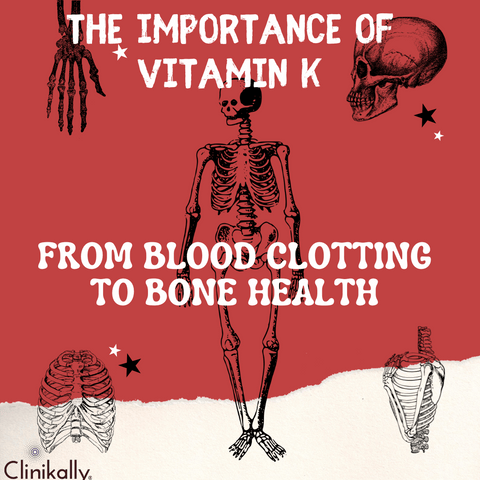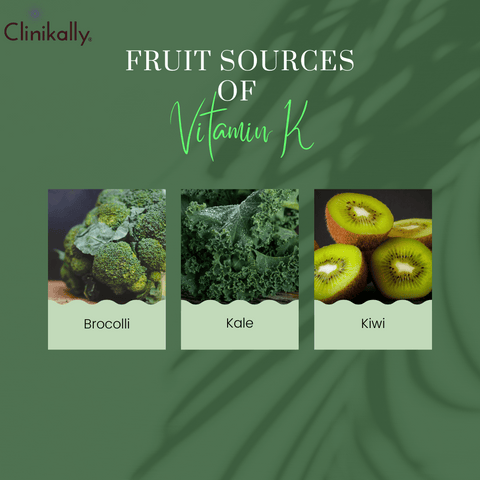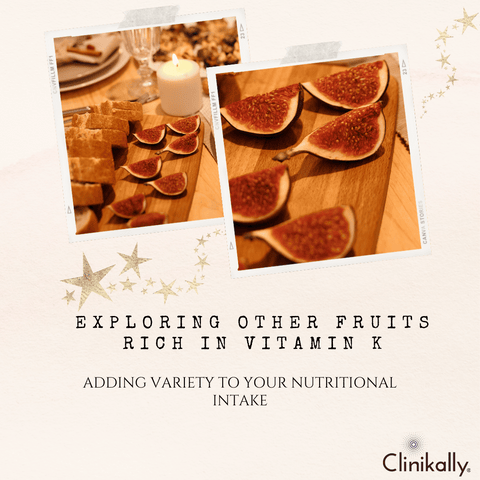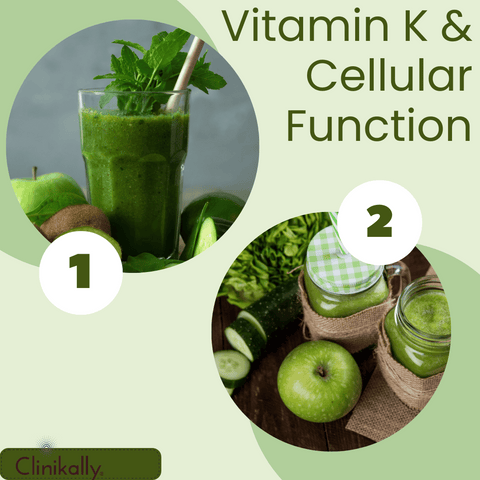Vitamin K is a vital component that helps with blood coagulation, bone health, and overall well-being. While green leafy vegetables are frequently associated with high vitamin K content, certain fruits can also deliver a large amount of this essential vitamin. Let's look at six fruits that are high in vitamin K, such as kiwi, prunes, avocado, blackberries, blueberries, and figs, and analyze their benefits, uses, and advantages. It's vital to note that the vitamin K concentration of fruits might vary depending on factors including ripeness, storage, and preparation methods. It is recommended that you consume a range of fruits and vegetables on a daily basis to ensure that you are getting a proper amount of vitamin K. While these fruits do contain some vitamin K, green leafy vegetables such as kale, spinach, and broccoli have a higher vitamin K concentration. So, including a variety of fruits and vegetables in your diet will allow you to reap the full benefits of vitamin K.
The Importance of Vitamin K: From Blood Clotting to Bone Health

Vitamin K is essential for many aspects of health, particularly blood clotting and bone health. Let us look more closely at the role of vitamin K in these areas:
-
Blood clotting: One of vitamin K's primary functions is to aid in the process of blood clotting. When there is an injury and blood vessels are damaged, vitamin K aids in the activation of certain proteins known as clotting factors. These clotting factors collaborate to form blood clots that stop excessive bleeding. Without enough vitamin K, the blood's ability to clot properly is compromised, increasing the risk of bleeding disorders.
-
Bone health: Vitamin K also helps to keep bones strong and healthy. It aids in the regulation of calcium levels in the body and the production of proteins required for bone mineralization. Vitamin K, in particular, activates a protein called osteocalcin, which aids in the binding of calcium to the bone matrix, thereby increasing bone strength and density. Inadequate vitamin K levels may result in decreased bone mineralization, raising the risk of osteoporosis and fractures.
Beyond blood clotting and bone health, emerging research suggests that vitamin K may have additional health benefits:
-
Heart health: Some research suggests that vitamin K may play a role in cardiovascular health. It may aid in the prevention of calcium deposition in the arteries, which can lead to arterial stiffness and cardiovascular disease. Vitamin K may aid in the maintenance of healthy blood vessels by promoting proper calcium utilization and distribution.
-
Cognitive function: There is an increasing interest in the possible link between vitamin K and brain health. According to research, vitamin K may help cognitive function by promoting healthy brain structures and lowering the risk of neurodegenerative diseases like Alzheimer's. However, more studies are needed to establish a clear link.
-
Anti-inflammatory properties: Anti-inflammatory properties of vitamin K may contribute to its overall health benefits. Chronic inflammation has been linked to a variety of health problems, including heart disease, diabetes, and certain cancers. By modulating inflammation, vitamin K may help mitigate the risk and progression of these diseases.
Understanding the Role of Vitamin K in Blood Clotting and Coagulation
Vitamin K is essential for blood clotting and coagulation processes. To ensure healthy blood coagulation, an optimal balance of clotting factors and anticoagulant proteins must be maintained. Inadequate vitamin K levels can result in reduced clotting function, increased bleeding tendency, or clotting disorders. Excessive vitamin K intake, on the other hand, may interfere with the effects of anticoagulant drugs such as warfarin, which function by blocking the action of vitamin K-dependent clotting factors.
It's important to note that while vitamin K insufficiency is uncommon in healthy people, it can occur in specific diseases such as liver illness, malabsorption problems, or long-term use of certain medications such as antibiotics. Vitamin K supplementation may be required under physician supervision in such circumstances. If you have concerns about blood clotting or coagulation disorders, you should seek the advice of a healthcare professional who can do a comprehensive evaluation and provide appropriate treatment.
Supporting Strong Bones: Vitamin K's Impact on Bone Health and Calcium Regulation
Vitamin K is essential for bone health and the regulation of calcium metabolism. Let us take a closer look at how vitamin K affects bone health and calcium regulation:
-
Calcium regulation: Vitamin K is involved in calcium regulation in the body. It aids in the activation of osteocalcin, a protein responsible for binding calcium to the bone matrix. This process is critical for proper bone mineralization because it ensures calcium incorporation into the bone structure, resulting in strong and resilient bones.
-
Bone formation and remodeling: Vitamin K is involved in the processes of bone formation and remodeling. It stimulates osteocalcin synthesis by osteoblasts, the cells responsible for bone formation. Osteocalcin not only aids in calcium binding, but it also stimulates new bone growth.
-
Osteoporosis prevention: Adequate vitamin K levels have been linked to a lower risk of osteoporosis, a condition characterized by weak and brittle bones. Osteoporosis is frequently associated with decreased bone mineral density and an increased risk of fractures. Vitamin K's role in promoting proper bone mineralization helps maintain bone density and strength, reducing the risk of osteoporotic fractures.
-
Synergy with vitamin D: Vitamins K and D work together to promote bone health. Vitamin D aids calcium absorption from the intestines, whereas vitamin K ensures that calcium is properly utilized and directed to bone tissue. The interaction of these vitamins is critical for optimal bone health.
-
Calcium deposition inhibition: Vitamin K also aids in the prevention of abnormal calcium deposition in soft tissues such as arteries and cartilage. Adequate vitamin K levels promote the activation of a protein known as matrix Gla protein (MGP), which inhibits soft tissue calcification. This function is critical for avoiding conditions such as arterial calcification, which can lead to cardiovascular disease.
Beyond Clotting and Bones: Exploring the Lesser-Known Functions of Vitamin K
While vitamin K is well-known for its roles in blood clotting and bone health, it also serves other purposes in the body. Cardiovascular health, cognitive function, antioxidant action, gene expression regulation, and skin health are some of vitamin K's lesser-known activities. While these potential benefits of vitamin K are being investigated, further research is needed to determine the scope and mechanisms of its activity in these areas. Age, health status, and other factors can all influence vitamin K requirements. Always seek personalized advice on vitamin K intake and its possible advantages for specific health conditions from a healthcare expert or certified dietitian.
Fruit Sources of Vitamin K: Incorporating Leafy Greens and More into Your Diet

Incorporating vitamin K-rich fruits and leafy greens into your diet is a great way to ensure you get enough of this important nutrient. Here are some vitamin K-rich fruits and leafy greens to include in your diet:
-
Leafy greens include kale, spinach, and Swiss chard.
-
Broccoli and Brussels sprouts are examples of cruciferous vegetables.
-
Parsley and basil are two herbs.
-
Fruits include kiwi, prunes, and avocado.
To guarantee a diversified nutrient intake, change your fruit and vegetable choices. Also, use preparation procedures that keep the vitamin K content intact. Steaming or gently heating veggies helps preserve more vitamin K than boiling. Incorporating these vitamin K-rich fruits and leafy greens into your diet will supply you with the nutrients you need to promote blood coagulation, bone health, and other potential vitamin K advantages.
Kale: A Nutrient-Dense Powerhouse of Vitamin K and Other Essential Nutrients
Kale is a nutrient-dense powerhouse that contains a variety of essential nutrients, including a high concentration of vitamin K. Here are some key reasons why kale is considered a nutritional superstar:
-
Vitamin K content: Kale is one of the richest sources of vitamin K among commonly consumed vegetables. A cup of cooked kale contains more than 1000% of the recommended daily intake of vitamin K. Vitamin K is required for blood clotting, bone health, and a variety of other bodily functions.
-
Antioxidant activity: Kale is high in antioxidants, which help the body fight oxidative stress and inflammation. It contains flavonoids, carotenoids (such as beta-carotene and lutein), and vitamin C, all of which contribute to its antioxidant properties.
-
Fibre: Kale is high in dietary fibre, which aids digestion, promotes bowel regularity, and increases satiety. Adequate fibre consumption is essential for maintaining a healthy digestive system, as well as for weight management and heart health.
-
Vitamins and minerals: In addition to vitamin K, kale is rich in other vitamins and minerals that are essential for overall health. It includes calcium, potassium, magnesium, manganese, vitamin A, vitamin C, and vitamin B6. These nutrients have an impact on several metabolic processes, collagen synthesis, bone health, and immune function.
-
Phytonutrients: Kale contains a variety of phytonutrients, including sulforaphane, which has been linked to anti-cancer properties. Sulforaphane is formed when kale is chopped or chewed, activating the enzyme myrosinase.
-
Low in calories and carbohydrates: Kale is low in calories and carbohydrates, making it an excellent addition to any balanced diet, including those aiming for weight loss or blood sugar control. It provides important nutrients without adding unnecessary calories.
Spinach: Green Goodness Packed with Vitamin K and Antioxidants
Spinach is a leafy green vegetable with numerous health benefits, including being high in vitamin K and antioxidants. Here are some of the reasons spinach is regarded as a green goodness powerhouse:
-
Content of vitamin K: Spinach is renowned for having a high vitamin K content. A cup of cooked spinach contains more than a thousand times the daily recommended amount of vitamin K. This vitamin is necessary for healthy bones, blood clotting, and overall body performance.
-
Antioxidant-rich: Beta-carotene, lutein, zeaxanthin, vitamins C and E, and spinach are just a few of spinach's many antioxidants. These anti-oxidants lessen the risk of chronic diseases, fight oxidative stress, and neutralise dangerous free radicals.
-
Eye health: The carotenoids lutein and zeaxanthin, which are present in spinach, build up in the retina of the eye. These compounds have been associated with a lower risk of age-related macular degeneration (AMD) and help protect the eyes from harmful ultraviolet (UV) radiation.
-
Iron and folate: Iron, a mineral required for the creation of red blood cells and the transportation of oxygen, is present in spinach in good amounts. Additionally, it contains folate, a B vitamin important for cell division and DNA synthesis. To support foetal development, adequate folate intake is especially crucial during pregnancy.
-
Fibre: Dietary fibre, which is abundant in spinach and supports digestive health, encourages regular bowel movements, and aids in the maintenance of a healthy weight, is also good for the body. Fibre also aids in satiety, which prolongs your feeling of fullness.
-
Variety of nutrients: Spinach contains a wide range of important nutrients. It includes minerals like potassium, magnesium, and calcium, as well as vitamins A, C, and K. These vitamins and minerals are necessary for a number of bodily processes, such as immune support, bone health, and nerve function.
Blueberries: Bursting with Flavor and a Touch of Vitamin K
However, compared to other nutrients, blueberries only provide a small amount of vitamin K. Despite this, blueberries are bursting with flavour and offer a variety of health benefits. Let us look at some of the factors that make blueberries a wholesome fruit:
-
Antioxidant powerhouse: The anthocyanins that give blueberries their vivid blue colour are among the fruit is many antioxidants. These antioxidants support the body's defences against oxidative stress, which can cause cellular harm and chronic diseases.
-
Anti-inflammatory properties: Blueberries' anti-inflammatory properties are a result of their antioxidant content as well as other phytochemicals. Heart disease, diabetes, and some cancers are among the conditions that are linked to chronic inflammation. Including blueberries in your diet could aid in reducing inflammation and promoting general health.
-
High in fibre: Dietary fibre is present in abundance in blueberries. Fibre is crucial for supporting heart health, encouraging regular bowel movements, and preserving a healthy digestive system. Adequate fibre consumption can also aid in controlling blood sugar levels and weight.
-
Nutrient density: Blueberries are relatively low in calories but high in nutrients. They are high in vitamins C and K, as well as manganese and other minerals. These nutrients help with overall health and well-being.
-
Benefits for cognition: According to some studies, blueberries' antioxidants and other compounds may improve brain health and cognitive function. The regular consumption of blueberries has been linked to enhanced cognition in terms of learning, memory, and general cognitive function.
-
Support for heart health: Blueberries have been associated with better heart health. Heart disease risk factors like high blood pressure and oxidative stress may be lessened thanks to the antioxidants in blueberries. Additionally, the fiber content and anti-inflammatory properties of blueberries contribute to their heart health benefits.
Exploring Other Fruits Rich in Vitamin K: Adding Variety to Your Nutritional Intake

While vegetables tend to be more abundant in vitamin K than fruits, there are a few other fruits that can increase your daily intake of this vitamin.You can get an online dermatologists consultation for expert advice. The following fruits have additional health advantages in addition to having a small amount of vitamin K:
-
Kiwi: The fruit stands out for having high levels of vitamin C and is also a good source of vitamin K. It offers a sweet and tangy flavour that can be enjoyed on its own or as an ingredient in desserts, fruit salads, and smoothies.
-
Prunes: Prunes, also known as dried plums, have a high fibre content and only moderate amounts of vitamin K. They can be used as a quick and wholesome snack or added to baked goods, oatmeal, or trail mix.
-
Avocado: An unusual fruit with a lot of good fats and a tiny bit of vitamin K is the avocado. It can be added to toast or tacos, as well as salads, sandwiches, spreads, and other culinary preparations.
-
Figs: Figs are a tasty and healthy fruit with a small amount of vitamin K. They are delicious and can be added to salads, cheese plates, or desserts because they are sweet and can be eaten fresh or dried.
Prunes: A Sweet and Fiber-Rich Source of Vitamin K
Prunes, also referred to as dried plums, not only have a naturally sweet flavour but also a significant amount of fibre and vitamin K. Let us delve deeper into the advantages of prunes:
-
Vitamin K content: Prunes have a high vitamin K content, which is necessary for healthy blood clotting and bones. The recommended daily allowance of vitamin K is more than adequately covered by a serving of prunes that is one cup.
-
Fiber-rich: Prunes are particularly known for their high fiber content. Fibre is essential for digestive health, promoting regular bowel movements, and supporting overall gut health. Consuming prunes can help relieve constipation and contribute to a healthy and well-functioning digestive tract.
-
Antioxidant properties: Prunes contain antioxidants such as phenolic compounds and vitamin C. These antioxidants protect the body from oxidative stress, which can cause cellular damage and chronic disease. Antioxidants also help to maintain a healthy immune system.
-
Nutrient density: Prunes offer other beneficial nutrients, including potassium, vitamin A, and dietary sorbitol. Potassium is necessary for heart health and for preserving the body's proper fluid balance, and vitamin A supports strong immune and vision systems. Dietary sorbitol is a natural sugar alcohol that can have a mild laxative effect, aiding in relieving constipation.
-
Blood sugar control: Prunes, despite their sweet flavor, have a low glycemic index, which means they have little effect on blood sugar levels. Prunes are a good choice for people who are watching their blood sugar levels because of their fibre and sorbitol content, which contribute to a slower release of sugars into the bloodstream.
-
Versatile culinary use: Prunes can be enjoyed in various ways. They can be eaten as a snack on their own, added to trail mixes, or used as an ingredient in baking, cooking, or stewed fruit dishes. They can also be soaked and blended into smoothies, or used in recipes as a natural sweetener.
Kiwi: A Tangy Tropical Fruit with a Boost of Vitamin K
Kiwi is a tangy tropical fruit that not only has a refreshing flavour but also contains vitamin K. Let us look at some of the health benefits of kiwi, including its vitamin K content:
-
Vitamin K content: Kiwi is high in vitamin K, which is necessary for blood clotting and bone health. A medium-sized kiwi contains a significant amount of vitamin K, which is recommended daily.
-
The powerhouse of vitamin C: Kiwi is renowned for having a high vitamin C content. It actually has higher vitamin C content than citrus fruits like oranges. Vitamin C is an antioxidant that aids in collagen synthesis, immune system support, and free radical scavenging.
-
Fibre and digestive health: Dietary fibre, which is abundant in kiwis and encourages regular bowel movements, is good for the digestive system. A healthy gut microbiome and relief from constipation are both supported by fibre content.
-
Antioxidant properties: Kiwi contains a variety of antioxidants, including flavonoids and carotenoids. These antioxidants aid in the prevention of oxidative stress, the reduction of inflammation, and the promotion of overall health and well-being.
-
Potassium and heart health: Kiwi is high in potassium, a mineral that is essential for heart health, fluid balance, and muscle function. Adequate potassium intake is critical for maintaining healthy blood pressure levels.
-
Hydration and electrolyte balance: Kiwi contains a lot of water, which helps with hydration. It also contains important electrolytes like potassium and sodium, which aid in maintaining proper fluid and electrolyte balance in the body.
-
Low glycemic index: Kiwi has a low glycemic index, which means it has little effect on blood sugar levels. This makes it an ideal fruit for people who need to control their blood sugar levels.
Grapes: Juicy and Delicious, Offering a Hint of Vitamin K
Grapes are juicy and delicious fruits that contain a trace of vitamin K as well as several other health benefits. While grapes are not as high in vitamin K as leafy greens, they do provide a variety of nutrients. Let us look at some of the advantages of grapes:
-
Antioxidant-rich: Resveratrol, flavonoids, and vitamin C are just a few of the antioxidants that grapes contain. These antioxidants work to shield cells from free radical damage, lowering the risk of chronic illnesses and promoting general health.
-
Heart health: Grapes' polyphenols and antioxidants have been linked to improving heart health. They might assist in lowering blood pressure, reducing inflammation, and enhancing blood flow. By promoting normal cholesterol levels, the fibre in grapes can also benefit heart health.
-
Hydration: Grapes have a high water content, making them hydrating and refreshing. Staying hydrated is critical for many bodily functions and overall health.
-
Fibre: Grapes contain dietary fibre, which aids in the maintenance of regular bowel movements and promotes satiety. Including fiber-rich foods like grapes in your diet can help you maintain a healthy digestive system.
-
Micronutrients: Grapes contain a variety of vitamins and minerals, albeit in small amounts. These include vitamin K, vitamin C, potassium, and manganese. These nutrients help with immune function, collagen synthesis, electrolyte balance, and antioxidant activity.
-
Natural sweetness: Grapes have a naturally sweet flavor, making them a healthier alternative to processed sugary snacks. They can satisfy your sweet tooth while also providing nutritional value.
The Health Benefits of Vitamin K-Rich Fruits: Heart Health, Inflammation, and More

Beyond their vitamin K content, vitamin K-rich fruits provide numerous health benefits. Let us look at some of the health benefits associated with eating vitamin K-rich fruits:
-
Heart health: Several studies have found a link between vitamin K consumption and better cardiovascular health. Vitamin K may help reduce the risk of heart disease by preventing calcium buildup in the arteries and promoting proper blood clotting. Fruits high in vitamin K, such as kiwi, prunes, and grapes, can help with heart health when consumed as part of a balanced diet.
-
Anti-inflammatory effects: Chronic inflammation has been linked to a variety of diseases, including heart disease, diabetes, and certain types of cancer. Vitamin K, particularly vitamin K2, has been shown to have anti-inflammatory properties. By including vitamin K-rich fruits in your diet, you may be able to reduce inflammation and improve overall health.
-
Bone health: Vitamin K is well-known for its role in bone health. It works synergistically with other nutrients, such as calcium and vitamin D, to promote proper bone mineralization and strength. Fruits like kiwi, prunes, and grapes that contain vitamin K can contribute to maintaining healthy bones.
-
Antioxidant activity: Fruits high in vitamin K, like grapes and kiwis, are also abundant in antioxidants. Antioxidants are essential for scavenging dangerous free radicals, lowering oxidative stress, and shielding cells from harm. These fruits can strengthen your body's resistance to oxidative damage and advance general health if you eat them.
-
Cognitive health: Recent studies point to a possible link between vitamin K and cognitive function. According to some studies, consuming more vitamin K, especially vitamin K1, is linked to improved cognitive function and a lower risk of cognitive decline. Fruits with vitamin K, such as grapes and kiwis, may support brain health.
Promoting Heart Health: How Vitamin K Supports Cardiovascular Wellness
Through a number of mechanisms, vitamin K helps promote heart health. Let us examine how vitamin K promotes heart health:
-
Preventing arterial calcification: Vitamin K, specifically vitamin K2, aids in the regulation of calcium metabolism in the body. It activates a protein known as matrix Gla protein (MGP), which aids in the inhibition of calcium deposition in artery walls. By preventing arterial calcification, vitamin K helps maintain the elasticity and integrity of blood vessels, reducing the risk of cardiovascular diseases like atherosclerosis.
-
Blood clotting control: Vitamin K is necessary for the liver's production of clotting factors, which are crucial to the regulation of blood clotting. For wound healing and to stop excessive bleeding, proper blood clotting is essential. A healthy level of vitamin K ensures that blood clotting happens when it is necessary and lowers the risk of abnormal clotting or excessive bleeding, both of which can lead to cardiovascular complications.
-
Effects on inflammation: Vitamin K has anti-inflammatory qualities that may be advantageous for cardiovascular health. Cardiovascular diseases can develop and advance as a result of chronic inflammation. By modulating inflammatory processes, vitamin K may help reduce inflammation in blood vessels and contribute to a healthier cardiovascular system.
-
Antioxidant activity: Vitamin K has antioxidant properties that assist the body in scavenging dangerous free radicals. Free radicals have the potential to harm cells and cause oxidative stress, which is linked to cardiovascular diseases. By reducing oxidative stress, vitamin K supports the overall health and function of the cardiovascular system.
Anti-Inflammatory Properties: Vitamin K's Potential Impact on Reducing Inflammation
Vitamin K has anti-inflammatory effects, which may aid in the reduction of inflammation in the body. Vitamin K may help with inflammation management by modulating cytokines, inhibiting the NF-B pathway, reducing oxidative stress, and interacting with anti-inflammatory mechanisms. While vitamin K's anti-inflammatory capabilities are intriguing, additional research is needed to completely understand the degree of its impact on inflammation and its therapeutic consequences. Additionally, it is critical to take a comprehensive approach to inflammation control, which includes a well-balanced diet, frequent physical activity, stress management, and appropriate sleep. To potentially benefit from their anti-inflammatory properties, consuming vitamin K-rich foods—such as leafy greens, cruciferous vegetables, and fermented foods—in your diet is a good idea. However, it is always best to speak with a healthcare provider if you have particular inflammatory conditions or concerns in order to receive individualized guidance and treatment options.
Vitamin K and Cellular Function: Exploring Its Role in Optimizing Cellular Processes

Vitamin K is a crucial nutrient that optimizes cellular processes in the body. Here is an investigation into its importance in cellular operation:
-
Energy production: Vitamin K is involved in the process of producing cellular energy. It contributes to the production of adenosine triphosphate (ATP), the primary energy currency of cells. ATP is essential for cellular activity and metabolic processes.
-
Gene expression: Vitamin K affects gene expression, which is essential for cellular function and development. It aids in the regulation of gene expression in processes such as inflammation, cell growth, and differentiation. By modulating gene expression, vitamin K contributes to maintaining proper cellular function and overall health.
-
Protein modification: Vitamin K is required for the activation of VKDPs (vitamin K-dependent proteins). These proteins play diverse roles in cellular processes, including blood clotting, bone mineralization, and regulation of vascular health. Vitamin K activates enzymes that modify VKDPs, allowing them to carry out their functions.
-
Cellular signalling: Vitamin K helps with cellular signalling pathways. It influences the activation and function of proteins involved in cell signalling processes like cell growth, differentiation, and survival. Cell signalling is critical for maintaining normal cell function and tissue homeostasis.
-
Antioxidant activity: As an antioxidant, vitamin K protects cells from oxidative stress. It neutralises free radicals, which can harm cellular components such as DNA, proteins, and lipids. By reducing oxidative stress, vitamin K supports cellular health and helps prevent cellular damage and dysfunction.
-
Mitochondrial function: Mitochondria are the organelles within cells that produce energy. Vitamin K aids in the maintenance of optimal mitochondrial function. It helps to maintain mitochondrial membrane integrity, aids in ATP production, and contributes to overall cellular energy metabolism.
It's worth noting that vitamin K comes in a variety of forms, including vitamin K1 (phylloquinone) and vitamin K2 (menaquinones). While both forms contribute to cellular activities, vitamin K2 has a longer half-life and may have a greater impact on some cellular functions, such as bone and vascular health. It is important to incorporate vitamin K-rich foods such as leafy greens, cruciferous vegetables, and fermented foods to guarantee enough vitamin K consumption for optimising cellular activities. Individual vitamin K requirements, on the other hand, may vary depending on factors such as age, health status, and medications. For personalised dietary advice and to determine the optimal vitamin K consumption for your unique needs, speak with a healthcare expert or certified dietitian.
































